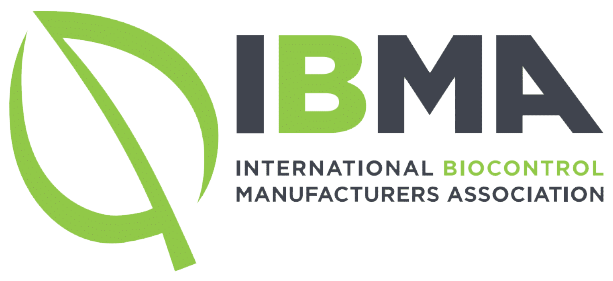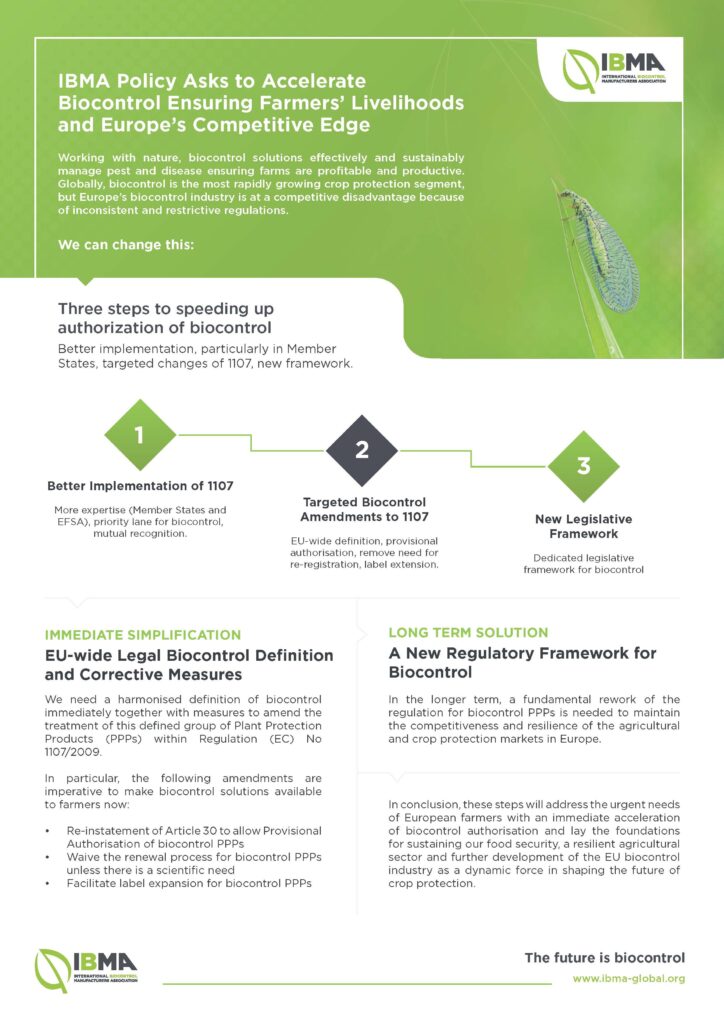Working with nature, biocontrol solutions effectively and sustainably manage pest and disease ensuring farms are profitable and productive. Globally, biocontrol is the most rapidly growing crop protection segment, but Europe’s biocontrol industry is at a competitive disadvantage because of inconsistent and restrictive regulations. Read our Position Paper on how to change this.
Right now, biocontrol is regulated under the EU Plant Protection Products (PPPs) Regulation (EC) No 1107/2009, together with chemical pesticides. This means when new solutions are submitted for approval, they are subject to the same process as chemical pesticides. Having a biocontrol definition could change this because biocontrol solutions would be recognized as a group of products distinct from chemical pesticides, that could then be treated separately, while still emphasizing the need for a robust and scientifically appropriate risk assessment.
In fact, the European Union probably has the most complex framework in the world with the longest authorisation timelines for biocontrol products that leaves farmers waiting up to 10 years for new products compared to 2 – 3 years in other global jurisdictions. What’s more, this process is wasting everyone’s time and resources which could be better invested in attracting the next generation of farmers and equipping them with the tools they need for the future of food and farming.
At the same time, the EU President’s political guidelines highlight the need to “make business easier and deepen our Single Market to help innovative companies grow” while Draghi states that “innovative companies that want to scale up in Europe are hindered at every stage by inconsistent and restrictive regulations.”
An IBMA study from 2023 shows that there is a consolidated pipeline of biocontrol – 129 biocontrol substances, of which 75 are new biocontrol substances- for EU submission between 2023-28, but if the current regulatory framework does not change, these submissions will not reach the market until 2033-2038. In the meantime, EU farmers are losing active substances and have fewer products available to control pests and diseases.
Published 19 February, the Vision for Agriculture and Food states
“Equally, the Commission will in 2025, as part of the simplification package in Q4, put forward a proposal that accelerates the access for biopesticides to the EU market. It will provide a definition of biocontrol active substances, introduce the possibility for Member States to grant provisional authorisations for plant protection products containing such biocontrol active substances while their evaluation is still ongoing and create a fast-track procedure for their approval and authorisation.” (p.19)
Farmers need biocontrol now
- Immediate simplification – EU-wide legal biocontrol definition and corrective measures
A harmonised legal definition of biocontrol PPPs is immediately needed together with measures to amend the treatment of this defined group of PPPs within Regulation (EC) No 1107/2009.In particular, the following amendments are imperative to make biocontrol solutions available to farmers now:
- Re-instatement of Article 30 to allow Provisional Authorisation of biocontrol PPPs
- Waive the renewal process for biocontrol PPPs unless there is a scientific need
- Facilitate label expansion for biocontrol PPPs
These corrective measures to deal with the most serious bottlenecks in the current system have already been extensively discussed, identified by the European Commission and elaborated in the form of a set of relatively simple amendments to Regulation (EC) No 1107/2009 all in connection with the proposal for a Sustainable Use Regulation. While the overall Sustainable Use Regulation was heavily debated and ultimately withdrawn by the European Commission, these corrective measure for biocontrol PPPs received broad political support.
The ‘Vision for Agriculture and Food’ refers to some of these measures via a simplification package to accelerate biocontrol access. We now need these concrete simplification measures to be included in a legislative proposal.
As to the three main measures outlined above :
- Biocontrol PPPs are nature-based solutions. The process of provisional authorisation follows the initial evaluation procedure to ensure a robust safety evaluation has been made and can be reinstated for biocontrol PPPs allowing immediate access for farmers. ,
- The current re-registration procedure for biocontrol PPPs which is set between 10-13 years is bureaucratic and wasteful of competent authorities and industry resources for no gain in safety evaluation. This time could be spent evaluating new biocontrol PPPs currently held up in the backlog of evaluations.
- Biocontrol PPPs are frequently first authorised in fruit and vegetable crops where the demand for sustainably grown produce is strongest. There is now an urgent need to extend these authorisations to arable crops and facilitation of label expansion of biocontrol PPPs can increase their availability in arable crops.
2. Long Term Solution – A New Regulatory Framework for Biocontrol
In the longer term, a fundamental rework of the regulation for biocontrol PPPs is needed to maintain the competitiveness and resilience of the agricultural and crop protection markets in Europe.This will contribute to food security, ensure a continuous stream of innovative and sustainable crop protection solutions to farmers, and stimulate investments and innovation in future-proof crop protection technologies. Europe has the ambition to be a global leader in sustainability and should have the ambition to develop and produce most biocontrol products used in Europe and to maintain a leading role in the global crop protection industry as it makes the transition to biocontrol.
To deepen the European Single Market, a new fit for purpose regulatory framework is required for biocontrol. The new regulation should consolidate a future-proof regulatory environment and well-tune to the market needs for biocontrol. It should result in a one-step procedure of 1.5-2 years in the EU for the authorisation of biocontrol products based on new active substances, and a shorter procedure for biocontrol PPPs based on active substances already on the EU market.
This will require a Single Agency for biocontrol active substances and products.
This new Regulation should therefore establish an EU group of biocontrol experts that would deal with the applications (incl. pre-submission meetings) and assessments for the placement of biocontrol in the EU market in a centralised and efficient way using harmonized procedures. These experts should be hosted by a European Biocontrol Agency. This agency should be an independent entity and could be part of an existing authority (such as EFSA) with a specific and independent mandate. Furthermore, it should be staffed by experts from EU Member States selected based on their good understanding of biocontrol, biology and/or ecology and relevant scientific know-how, and should not represent a specific Member State. Finally, this agency should be financed by a combination of general funds and fees that are related to the handling of applications.
Other key features include: (i) moving away from the current zonal system established under Regulation (EC) No 1107/2009 so that there would be instead one single zone for biocontrol products (‘one market, one assessment’) and (ii) a risk assessment procedure adapted for biocontrol products. Practically, the applicant would submit an application to the Agency and indicate in which Member State they are looking for an authorisation.
The establishment of a fit-for-purpose EU Biocontrol Agency would result in efficiency gains by unifying EU resources and expertise; produce high(er) quality and consistency of evaluations and assessments in line with the Single Market; be better equipped and more agile to deal with innovation; having one single contact point for international players and applicants and improve consistency and predictability.
In conclusion, only by rapidly introducing a legal EU-wide definition for biocontrol PPPs and ensuring targeted amendments to EU Regulation (No) 1107/2009 for these biocontrol PPPs -via any immediate legislative initiative- will the EU address the urgent needs of European farmers through an immediate acceleration of biocontrol authorisations. In the longer term, elaborating a new fit-for-purpose regulation for biocontrol will lay the foundations for sustaining our food security, a resilient agricultural sector and further development of the EU biocontrol industry as a dynamic force in shaping the future of crop protection.
 Square de Meeûs 35, 1000 Bruxelles
Square de Meeûs 35, 1000 Bruxelles
